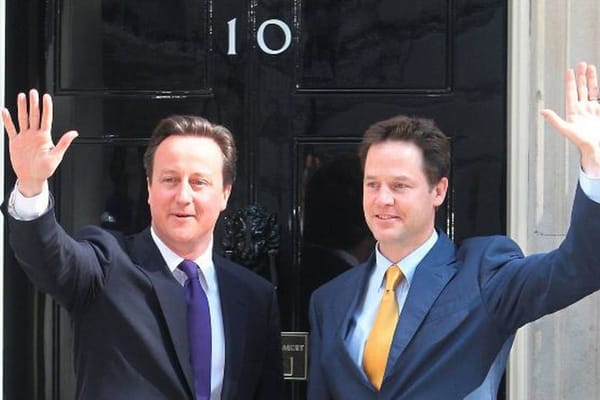Double Trouble?
As Rosberg and Hamilton go head to head one last time, Felix asks whether the awarding of double points in the final race is a good thing.
The 'yes' argument
The world’s premier motorsport competition descends on the Yas Marina Circuit in Abu Dhabi for the final race of the season in a cloud of anxiety, uncertainty, and the usual hefty dose of controversy. The awarding of double points for the season ending Grand Prix was announced, among a raft of other changes, back in early December 2013. The potential for controversy was always obvious, but it is only now that we are finding out what the real implications are.
Following Sebastian Vettel’s dominant 2013 season, there was a profound sense that something needed to change. Romping home to the title with three races to spare, the German ended the Formula One season in every sense but on paper. F1, like any sport, must carefully tread the line between honest competition and entertainment. No one wants to see artificial competition for its own sake but, as the financial struggles of minor teams come to the fore, it has never been clearer that F1 needs to do more to engage with its fans. Three dead rubber races at the end of the season do no-one any good.
Imagine if the final day of the Ryder Cup was purely ceremonial, or Jessica Ennis-Hill was so far in front that she needn’t turn up for the final events of the Olympic heptathlon. Yes, the purity and the authenticity of the sporting contest must be maintained, but sport has drama at its very heart. As double points maintains the possibility that the result could change, it preserves the drama for as long as possible.
Without double points, Hamilton would only have needed podiums after his win at the Austin Grand Prix. Given the quality of the car he is driving, that would be all but guaranteed. Don’t get me wrong, I want Lewis Hamilton to win the title, and there is no doubt in my mind that he has been the best driver all year. The very essence of sport, however, is that, on ‘any given Sunday’, it is all up for grabs. Make no mistake, if Lewis loses the title this weekend, it will not be because of double points. If Nico Rosberg wins on Sunday, Lewis will still outclass him 10-5 in race wins. If he is not crowned World Champion it will be down to his poor results early in the season. Whether those failures were the fault of the team, the result of Lewis abusing his car, due to foul play by Nico, or downright bad luck, we will never know. But in the context of double points it is totally irrelevant. Lewis has been the better driver all year, but under both points systems he could still lose this year’s title. Rules change more frequently in F1 than any other sport. Success has always gone to the team that best adapts. As changes go, this is relatively minor.
When Rugby Union introduced end of season play offs to decide the title in 2003 Gloucester finished the regular season a mammoth 15 points clear, only to lose the final to London Wasps. They were not pleased. A decade on and the drama of a Premiership Final has introduced new fans to the sport while the season builds healthily to a resounding climax. The contrast to an F1 season could not be more pronounced. The championship begins with the intrigue of winter testing, a first glimpse of the cars and the initial whispers of who might have top pace. The first few races come thick and fast and we quickly establish the front runners. All too often and all too quickly the season trails off. One or two teams become established at the front and the competition is as good as over. Mid table outfits turn their attention to next year’s car and leave the driver to battle on valiantly for minor points. As a spectacle it still has appeal; the glitz and glamour of Monaco, the raw tribalism of the Tifosi at Monza, the stunning street circuit under lights at Singapore. These iconic events will always hold a place in the sporting calendar, but the championship as a whole has lost its edge. Whether it was Schumacher driving his Ferrari into the distance a decade ago or Vettel’s dominance of recent years, champions soon became unpopular because races became boring. Even Jenson Button’s 2009 World Championship is tainted by the fact that it was essentially won before the summer break. A championship that goes to the wire, such as Hamilton’s 2008 win and this year’s contest, is better for the sport and everyone involved in it. Since 1991, the result of just three championships would have changed, an additional three championships would have gone to the wire and on those occasions, more drivers would have been involved in the shootout.
F1 will always have a die-hard following of motorsport fans and the backing of the world’s rich and powerful. In that way its survival is not under threat. But if it is to truly thrive and take the place it deserves at the top table of world sports, then it must not be afraid to change its ways. Double points may not be perfect – it may need tweaking. Perhaps it could be extended to the last three races to reduce the random element of it, or a gradual increase over the course of the season to keep all the teams engaged. There are options. The big players in F1 got all the other changes spot on this season, and they are on to something here too.
I hope they have the courage to stick with it.
The 'no' argument
Formula One is no longer interesting. Audiences are dwindling across the globe and sponsors are unhappy. Solution? A double points system for the finale. Why? Because a margin of two race victories coming to the ultimate event is virtually impossible for a driver to achieve. The hope is that by artificially extending the title contest to the final Grand Prix, people will still watch the proceedings when they may have otherwise tuned out. More viewers and no regulation changes for the teams to worry about; it could be the perfect solution to all of the sports problems. Does it sound too good to be true? It may be great for a casual viewer of the sport but in reality the system will just hurt every other aspect of the competition.
At the whim of meddling management, Formula One has undergone many alterations in recent years to the frustration of the sports core audience. These regulation changes were designed to increase the competitiveness of the races but have resulted in the cars being slower and give the air of a sport that is actively set against any form of innovation. This has been compounded by the introduction of the “overtake button” (KERS) and the Drag Reduction System (DRS) which are are prominent examples of how the action has been tampered with to artificially generate exciting racing. These moves are punishing the core fan base of the sport who are equally interested in the technical aspects as the racing. Already discontented seasoned viewers have also had to cope with a series of adjustments to the way in which the points are awarded at the races designed to reward more aggressive driving. The system has changed from 10 points being given to the winner and only the top six positions scoring in 2002 to now where the top ten placed cars are handed points and the winner receives 25.
Awarding double points in the race at Abu Dhabi suggests that the race is in some way more important than the other 18 but the challenges facing the teams are exactly the same as at many of the other venues. The distance covered over the duration of the race is the same and the weather won’t play a part as the track is guaranteed to be bone dry throughout. The Yas Marina Circuit is one of many examples of a Hermann Tilke design on the Formula One calendar which, with run-off areas that stretch for miles, offers few challenges to the drivers during the course of a lap. The only factor of note is that the race commences in daylight and finishes under artificial lighting which, with other races offering it, is just another gimmick.
But what about the teams? Giving a greater share of the points later on in the season penalises the teams who start the year with a good package and those that do not have the capacity to develop their car throughout the season. The smaller teams with tighter budgets invariably stop development on the current car when they begin designing its successor – typically around August or September – whereas larger teams such as Mercedes and Red Bull have the workforce and capital to do both simultaneously. When the prize money awarded to each team is determined by their finishing position in the Championship, it hardly seems fair to penalise those with little money even further.
Had the system been introduced before, it would have had major impacts on the outcomes of previous World Championships. Hamilton would never have been crowned world champion in 2008 with the title instead going to Felipe Massa when he won the final race in Brazil. Fernando Alonso would have finished ahead Sebastian Vettel in 2012 and Michael Schumacher’s record breaking seven titles, five of which were consecutive, would’ve been reduced by one through losing the 2003 Championship to Kimi Raikkonen. Having the result of a championship decided on the whim of the already controversial F1 Strategy Group would generate a huge backlash that could do lasting damage to the reputation of the sport.
Could double points be translated into other sports? If one day football fanatics across the country awoke to the news that the Premier League will be awarding double points on the last day of the season the reaction would unlikely be positive. Why is one match worth more than another? What if we are playing away from home? Have we got an easy draw? It could hardly be claimed as fair when the difficulty of the each game varies so greatly. Many of these points extend to Formula One where cars are suited to particular types of circuit and home advantage may be at play.
The double points system is just another example of Formula One moving away from it roots as a respected and technical sport and erring towards light entertainment for a Sunday afternoon. The stranglehold that parties of commercial investors have over the direction of Formula One will inevitably discourage the sports core audience from watching the coverage in the future. If the result of the World Championship this year is affected by the system in place for Abu Dhabi, the repercussions will resonate long into the future and could cripple the franchise as a whole.








